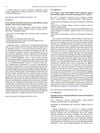 1 citations,
June 2023 in “Biomolecules & therapeutics”
1 citations,
June 2023 in “Biomolecules & therapeutics” Nitric oxide is important for skin functions and both helps protect against and contributes to skin inflammation and sensitization.
195 citations,
December 2009 in “Journal of Investigative Dermatology” Free fatty acids in sebum boost skin's defense against acne by increasing antimicrobial peptides.
 3 citations,
April 2019 in “The journal of investigative dermatology/Journal of investigative dermatology”
3 citations,
April 2019 in “The journal of investigative dermatology/Journal of investigative dermatology” ILC1 cells contribute to hair loss in alopecia areata.
 82 citations,
June 2020 in “Inflammation Research”
82 citations,
June 2020 in “Inflammation Research” Skin problems in COVID-19 patients are rare and may be due to the body's complex immune response or blood clotting issues.
 54 citations,
January 2018 in “Scientific reports”
54 citations,
January 2018 in “Scientific reports” Human hair contains diverse proteins, including keratins and histones, which could help assess hair health and aging.
 1 citations,
May 2012 in “Hair transplant forum international”
1 citations,
May 2012 in “Hair transplant forum international” Hair loss in men may be caused by inflammation triggered by hormones, and treatments reducing inflammation could potentially promote hair growth.
1 citations,
June 2006 in “Experimental dermatology” The conclusion suggests that early signs of hidradenitis suppurativa may start in the hair follicle, with genetic and immune factors playing a role, highlighting the need for more research on the hair follicle's immune system.
 4 citations,
December 2022 in “International Journal of Molecular Sciences”
4 citations,
December 2022 in “International Journal of Molecular Sciences” Zinc is crucial for skin health and treating various skin disorders.

Alopecia areata patients have higher levels of certain immune receptors, suggesting new treatment possibilities.
 27 citations,
July 2012 in “Dermatologic Surgery”
27 citations,
July 2012 in “Dermatologic Surgery” Higher caspase-1 levels found in balding scalps; reducing it may help treat hair loss.
 25 citations,
March 2014 in “Experimental Dermatology”
25 citations,
March 2014 in “Experimental Dermatology” Leptin helps start the growth phase of hair.
 21 citations,
April 2010 in “Molecular Medicine Reports”
21 citations,
April 2010 in “Molecular Medicine Reports” Zinc supplementation may help improve treatment outcomes for chronic hepatitis C.
 11 citations,
November 2018 in “Journal of the American Academy of Dermatology”
11 citations,
November 2018 in “Journal of the American Academy of Dermatology” Tofacitinib therapy can effectively regrow eyebrows and eyelashes in some alopecia areata patients.
 3 citations,
May 2023 in “Frontiers in immunology”
3 citations,
May 2023 in “Frontiers in immunology” Faulty inflammasome activation may lead to autoimmune skin diseases and could be a target for new treatments.
 December 2012 in “Journal of dermatological science”
December 2012 in “Journal of dermatological science” Hair follicles help attract immune cells to minor skin injuries.
 October 2011 in “Dermato-endocrinology”
October 2011 in “Dermato-endocrinology” Hormones significantly affect skin health, with vitamin D playing a key role.
 28 citations,
January 2012 in “Biological & pharmaceutical bulletin”
28 citations,
January 2012 in “Biological & pharmaceutical bulletin” Hairless protein can both repress and activate vitamin D receptor functions, affecting gene regulation.
 2 citations,
January 2014 in “Medical Principles and Practice”
2 citations,
January 2014 in “Medical Principles and Practice” The study suggests that people with rosacea are more likely to have chronic rhinosinusitis.
 106 citations,
October 2016 in “Cell Stem Cell”
106 citations,
October 2016 in “Cell Stem Cell” PDGFA/AKT signaling is important for the growth and maintenance of certain skin fat cells.
 80 citations,
June 2020 in “Dermatopathology”
80 citations,
June 2020 in “Dermatopathology” COVID-19 can cause various skin lesions, which may result from the virus and immune response, and are not directly linked to illness severity.
 51 citations,
January 2012 in “Annals of dermatology/Annals of Dermatology”
51 citations,
January 2012 in “Annals of dermatology/Annals of Dermatology” A boy with alopecia regrew hair using a vitamin D cream after other treatments failed.
 47 citations,
September 2016 in “Reviews in endocrine and metabolic disorders”
47 citations,
September 2016 in “Reviews in endocrine and metabolic disorders” The skin's ability to produce hormones is linked to various skin conditions, and better understanding this process could lead to new treatments.
 47 citations,
June 2012 in “Genes & Development”
47 citations,
June 2012 in “Genes & Development” A mother's western diet can make her milk toxic, causing inflammation and hair loss in babies.
 22 citations,
October 2020 in “Anais Brasileiros de Dermatologia”
22 citations,
October 2020 in “Anais Brasileiros de Dermatologia” The Brazilian Society of Dermatology agrees that oral isotretinoin is effective for acne and other skin conditions, and it's safe when monitored, but more research is needed on dosing and duration.
 19 citations,
March 2019 in “Behavioural Brain Research”
19 citations,
March 2019 in “Behavioural Brain Research” Finasteride use can cause depression-like behavior in male rats.
 18 citations,
September 2016 in “International Journal of Molecular Sciences”
18 citations,
September 2016 in “International Journal of Molecular Sciences” Polydeoxyribonucleotide (PDRN) may help lighten skin and treat hyperpigmentation.
 14 citations,
January 2020 in “International Journal of Biological Sciences”
14 citations,
January 2020 in “International Journal of Biological Sciences” Ranitidine and finasteride lower TMAO levels, reducing heart and kidney damage by changing gut bacteria.
 14 citations,
August 2018 in “Frontiers in Cellular and Infection Microbiology”
14 citations,
August 2018 in “Frontiers in Cellular and Infection Microbiology” Dengue virus can infect human hair follicle cells and may cause hair loss.
 12 citations,
May 2017 in “Journal of Dermatological Treatment”
12 citations,
May 2017 in “Journal of Dermatological Treatment” Adult acne severity is influenced by stress, skin sensitivity, makeup, stopping oral contraceptives, and requires female-specific treatment guidelines.
 11 citations,
March 2018 in “Protoplasma”
11 citations,
March 2018 in “Protoplasma” Lipopolysaccharides boost wheat seedling growth, but procyanidin B2 weakens this effect.




























